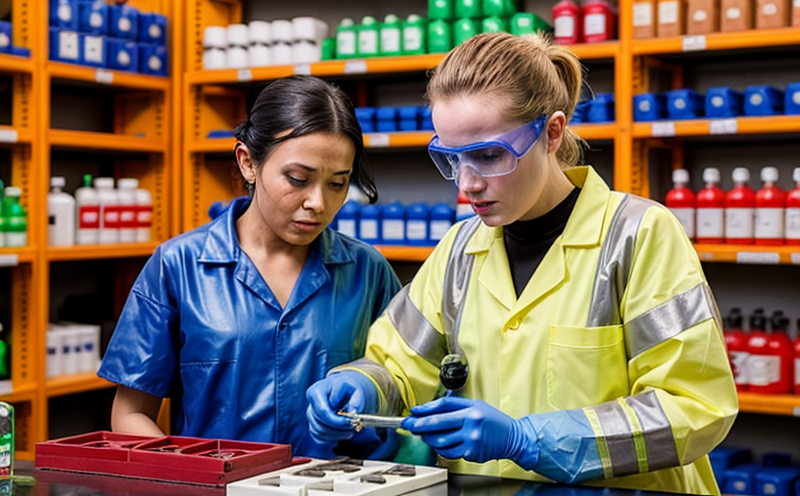JIS K0125 Hazardous Gas Testing for Imported Chemicals
Compliance with international standards is paramount in ensuring that imported chemicals are safe and reliable. The Japanese Industrial Standard (JIS) K0125 specifies procedures for testing hazardous gases within chemical substances, particularly focusing on the detection and quantification of these gases to ensure they meet stringent safety requirements before being introduced into the market.
The significance of this test lies in its role as a safeguard against potential hazards associated with handling or using chemicals. By adhering to JIS K0125, laboratories and manufacturers can demonstrate their commitment to upholding rigorous quality control measures and regulatory compliance. This standard is particularly critical for industries dealing with hazardous materials, such as pharmaceuticals, chemical manufacturing, and environmental remediation.
The testing process under JIS K0125 involves several key steps. Initially, the sample of the imported chemical must be prepared in a manner that accurately reflects its composition and potential hazards. This preparation often includes dilution or purification processes to ensure an accurate representation of the hazardous gases present. Once prepared, the sample undergoes a series of tests designed to identify and quantify any potentially harmful gases.
The primary instrumentation used for JIS K0125 testing includes gas chromatographs (GCs) and mass spectrometers (MS). These tools are selected based on their ability to detect trace amounts of hazardous gases with high sensitivity and specificity. The test parameters include temperature, pressure, flow rate, and duration, all carefully controlled to ensure consistent results that adhere strictly to the standard.
Acceptance criteria under JIS K0125 are stringent, ensuring that only chemicals meeting these standards can be imported into Japan. Compliance with this standard is not just a regulatory requirement but also an indicator of trustworthiness in the chemical supply chain. Failure to meet these criteria can result in product rejection and potential legal penalties.
The importance of accurate testing cannot be overstated, especially considering the diverse range of hazardous gases that may be present within chemical substances. From carbon monoxide to hydrogen sulfide, each gas requires specific handling and detection methods. The laboratory's expertise in this area ensures that all tests are conducted with precision and reliability.
By adhering to JIS K0125, importers can ensure that the chemicals they introduce into Japan comply with international safety standards. This not only protects end-users but also enhances the reputation of the importing company in a competitive market. The testing process is designed to be transparent and reproducible, providing confidence to all stakeholders involved.
In conclusion, JIS K0125 Hazardous Gas Testing for Imported Chemicals plays a crucial role in safeguarding public health and environmental integrity. Through rigorous testing procedures and adherence to international standards, this service ensures that only safe and reliable chemicals enter the market, fostering trust and reliability within the industry.
Applied Standards
The JIS K0125 Hazardous Gas Testing for Imported Chemicals service strictly adheres to the following international standards:
- JIS K0125: Methods of Determination of Concentration of Gases in Chemical Substances
- ISO 13607: Determination of Volatile Organic Compounds (VOCs) in Air by Gas Chromatography-Mass Spectrometry (GC-MS)
- ASTM D5984: Standard Test Method for Analysis of Volatile Organic Compounds in Ambient Air Using Passive Diffusion Sampler and GC/MS
- EN 13725: Determination of Total Hydrocarbon Content in Ambient Air by Gas Chromatography (GC)
- IEC 60478-1: Measurement Techniques for Volatile Organic Compounds in Air - Part 1: General Principles and Methods
These standards provide a robust framework for ensuring the accuracy and consistency of hazardous gas testing, thereby enhancing the reliability of imported chemicals.
Quality and Reliability Assurance
- Calibration: Regular calibration of instruments using traceable standards to ensure precision.
- Data Validation: Cross-validation of results through multiple analytical techniques to confirm accuracy.
- Quality Control: Implementation of strict quality control measures at every stage of the testing process.
- Certification: Participation in proficiency testing programs and accreditation by recognized bodies.
- Training: Continuous training for staff to stay updated with the latest methodologies and technologies.
- Documentation: Maintaining comprehensive documentation of all test procedures and results.
The combination of these stringent quality assurance measures ensures that every test conducted meets the highest standards, providing clients with reliable and accurate data.
Use Cases and Application Examples
The JIS K0125 Hazardous Gas Testing for Imported Chemicals is primarily used by government agencies responsible for trade facilitation, ensuring that imported chemicals meet the stringent safety standards set forth by Japanese regulations. This testing service also benefits pharmaceutical companies, chemical manufacturers, and environmental remediation firms looking to ensure the safety of their products before they enter the market.
A key application example involves a large pharmaceutical company importing new drug formulations. Before these formulations can be sold in Japan, they must undergo rigorous testing to identify any hazardous gases that could pose risks during storage or use. The results from JIS K0125 testing provide clear evidence of compliance with international standards, facilitating smoother trade processes.
In another instance, an environmental remediation company may import specialized chemicals used for soil and water treatment. These chemicals must be tested to ensure they do not release harmful gases during application. By adhering to JIS K0125, the company can demonstrate its commitment to safety and regulatory compliance, thereby gaining trust from both clients and regulators.
For quality managers in chemical manufacturing plants, this service offers a valuable tool for maintaining high standards of product safety throughout the supply chain. It ensures that imported chemicals meet not only domestic but also international safety criteria, helping manufacturers maintain their reputation and market position.





